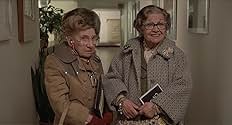Mae Questel(1908-1998)
- Actress
- Soundtrack
Her Orthodox Jewish family was totally averse to her having an entertainment career. Her parents and grandparents forced her to leave the Theatre Guild school (New York) while still a teenager and had their wills drawn up accordingly so as to discourage this career choice.
Studied drama at Columbia University, and belonged to the American Theatre Wing.
When Mae was 17 and living in the South Bronx, she won a local contest to find the girl who most resembled Helen Kane, a popular singer known as the "Boop-Oop-A-Doop Queen". She was promptly signed by an agent and began performing in the Vaudeville circuit. Billing herself as "Mae Questel - Personality Singer of Personality Songs," she performed dead-on vocal imitations of Maurice Chevalier, Eddie Cantor, Fanny Brice, Marlene Dietrich, Mae West and of course Helen Kane, among many others. Her mimic talent also provided duck, dog, chicken, owl, monkey, lion and baby sounds for radio shows.
Betty Boop creator Max Fleischer heard Mae doing her "boop-oop-a-doop" routine and hired her to do the character's voice in 1931. She served as the voice on more than 150 Betty Boop animated shorts until the character was retired in 1939. Her recording of "On The Good Ship Lollipop" sold more than 2 million during the Depression.
Best known as the voice of "Betty Boop", she was also the voice of not-so-less-famous "Olive Oyl" in the Popeye cartoons, as well as the toddler Swee'pea and others. She did Popeye's voice once, in the cartoon Shape Ahoy (1945), because Jack Mercer was serving in the military during World War II. Her versatility is probably better appreciated in the cartoon Never Kick a Woman (1936) in which she provides the quivery, nervous-Nellie voice of Olive Oyl, based on comedic actress Zasu Pitts, and the deep, assured, alluring voice of the blonde saleswoman, based on Mae West.
In 1968, the City of Indianapolis honored her with a "Mae Questel Day". In 1979, she won the Troupers Award for outstanding contribution to entertainment.
Studied drama at Columbia University, and belonged to the American Theatre Wing.
When Mae was 17 and living in the South Bronx, she won a local contest to find the girl who most resembled Helen Kane, a popular singer known as the "Boop-Oop-A-Doop Queen". She was promptly signed by an agent and began performing in the Vaudeville circuit. Billing herself as "Mae Questel - Personality Singer of Personality Songs," she performed dead-on vocal imitations of Maurice Chevalier, Eddie Cantor, Fanny Brice, Marlene Dietrich, Mae West and of course Helen Kane, among many others. Her mimic talent also provided duck, dog, chicken, owl, monkey, lion and baby sounds for radio shows.
Betty Boop creator Max Fleischer heard Mae doing her "boop-oop-a-doop" routine and hired her to do the character's voice in 1931. She served as the voice on more than 150 Betty Boop animated shorts until the character was retired in 1939. Her recording of "On The Good Ship Lollipop" sold more than 2 million during the Depression.
Best known as the voice of "Betty Boop", she was also the voice of not-so-less-famous "Olive Oyl" in the Popeye cartoons, as well as the toddler Swee'pea and others. She did Popeye's voice once, in the cartoon Shape Ahoy (1945), because Jack Mercer was serving in the military during World War II. Her versatility is probably better appreciated in the cartoon Never Kick a Woman (1936) in which she provides the quivery, nervous-Nellie voice of Olive Oyl, based on comedic actress Zasu Pitts, and the deep, assured, alluring voice of the blonde saleswoman, based on Mae West.
In 1968, the City of Indianapolis honored her with a "Mae Questel Day". In 1979, she won the Troupers Award for outstanding contribution to entertainment.

































